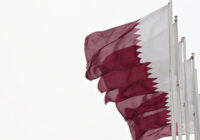Can the murder of Jamal Khashoggi be the catalyst that effectuates a sea change in global political ethics? The Daily Devil’s Dictionary explains.
As nations, politicians and personalities in the world of business have massively pulled away from their relations with Saudi Arabia over the now admitted murder of Jamal Khashoggi, Al Jazeera asks the embarrassing question: Why haven’t Arab countries expressed their concern over his murder? They point out that “a handful of Arab governments including Egypt, Lebanon, Jordan, Bahrain and the United Arab Emirates (UAE) did issue statements, but those were in solidarity with Saudi Arabia, which has faced an international backlash.”
Here is today’s 3D definition:
Solidarity:
1. Traditionally, an expression of unity and sympathy typically with a victim of oppression or criminal intent
2. In the modern world, abject complicity masquerading as empathy because of unproclaimed self-interest or unacknowledged dependence on the party with which one manifests solidarity
Contextual note
We learn that the UAE warned, among other things, that “repercussions of the political targeting of Saudi Arabia will be dire for those who fuel it.” This author received a similarly worded threat from a Saudi citizen on Twitter following the publication of a series of recent articles on this affair. Readers of the UAE’s statement should be left wondering what they mean by “political targeting”, but given the brutal punishment the Saudis meted out for Khashoggi’s reasonable, civilized and fundamentally constructive dissidence, we expect that the notion of “targeting” will be interpreted very broadly indeed, including such nefarious crimes as factual reporting.
The Al Jazeera article cites an exiled Saudi activist who describes the Saudis’ methods: “[T]he oil kingdom uses its Islamic influence and financial handouts to strategically form allies ‘who help support the regime when necessary.’” In other words, corruption compounded by cynical cultural intimidation.
Al Jazeera appropriately reminds us of Saudi Crown Prince Mohammed bin Salman’s shocking blockade of Qatar in 2017, endorsed by three other authoritarian Middle Eastern nations (the UAE, Bahrain and Egypt): “The quartet imposed a list of 13 demands, including shutting down Al Jazeera Media Network and consenting to monthly ‘compliance audits’ in order to lift the siege.” Even Scientology doesn’t do its own form of compliance auditing on a monthly basis! But Mohammed bin Salman’s grand projects have all failed to produce the expected results. Qatar has thus far survived the siege, and Al Jazeera has maintained its activity as a prestigious international news broadcaster.
Historical note
The authors of the article — Linah Alsaafin and Ramy Allahoum — sum up the entire issue in a single sentence: “Saudi Arabia has used its vast oil wealth to buy support while fear of reprisal has forced others to fall in line.” And why shouldn’t it? That is what wealth does in a world that has encouraged and even ennobled the accumulation of wealth, making it synonymous with power.
“He was killed in the consulate. We don’t know in terms of details how. We don’t know where the body is,” says Saudi Foreign Minister Adel al-Jubeir https://t.co/kLE6AA2rXF #JamalKhashoggi pic.twitter.com/6lvzBzZJ1G
— Al Jazeera English (@AJEnglish) October 22, 2018
The entire American electoral system — with its PACs and super PACs and its ideology expressed as the equivalent of a “fundamental freedom” by the Supreme Court in the Citizens United ruling — is now founded on the principle that “support” (even in the form of elections) and solidarity can and will be bought. What people consider shameful about Hollywood producer Harvey Weinstein is deemed legitimate in politics: the right of the wealthy to exploit the human tendency to seek to please those with money and power. Combined with “the fear of reprisal,” this consolidates power to create situations of uncomfortable, embarrassing and degrading dependence.
This is the face of the world and the new social values that enabled Donald Trump — a man with money and the compulsion to make people grovel at his feet — to be elected president of the United States. The Evangelical Christian base that contributed powerfully to electing Trump and the Islamic fundamentalists who have assumed or legitimized power in the rich oil monarchies of the Gulf have three things in common: a rigidly despotic view of human behavior, a presumptuous claim to moral authority they attribute to their religious traditions, and the freedom to violate their own most sacred categorical imperatives such as “thou shalt not kill” or reflections such as “the love of money is the root of all evil.” Instead, they acknowledge two new pragmatic principles that sum up their moral view of the world: “money talks” and piles of money murder (with impunity).
Fadi al-Qadi, a human rights and media advocate quoted in the article, highlights the global trend: “International political discourse is corrupted and built on very narrow political and economic interests.” He points out that the trend has gained speed following Trump’s election. But it didn’t start with Trump. And it truly is global, not confined to the autocratic regimes in the Middle East. It has the potential to devour a world in which humans no longer have moral agency.
The world of politics and business have merged. Money itself — potential profit — makes all the important decisions, which no one has the right to contest. As the “liberal” Democratic legislator Nancy Pelosi said, “we’re capitalists and that’s just the way it is.” And what is capitalism as it is practiced today?
Very simply, the primacy of the profit motive over any other pragmatic and ultimately moral consideration. The system’s apologists will say that we are protected by the law, which trumps mere profit motive and sanctions the transgressions it encourages. But the law in a nation such as Saudi Arabia is one man’s personal ambitions. And when the US Supreme Court tells us “money is speech,” where is the law we might appeal to for some kind of moral guidance?
*[In the age of Oscar Wilde and Mark Twain, another American wit, the journalist Ambrose Bierce, produced a series of satirical definitions of commonly used terms, throwing light on their hidden meanings in real discourse. Bierce eventually collected and published them as a book, The Devil’s Dictionary, in 1911. We have shamelessly appropriated his title in the interest of continuing his wholesome pedagogical effort to enlighten generations of readers of the news.]
The views expressed in this article are the author’s own and do not necessarily reflect Fair Observer’s editorial policy.
Support Fair Observer
We rely on your support for our independence, diversity and quality.
For more than 10 years, Fair Observer has been free, fair and independent. No billionaire owns us, no advertisers control us. We are a reader-supported nonprofit. Unlike many other publications, we keep our content free for readers regardless of where they live or whether they can afford to pay. We have no paywalls and no ads.
In the post-truth era of fake news, echo chambers and filter bubbles, we publish a plurality of perspectives from around the world. Anyone can publish with us, but everyone goes through a rigorous editorial process. So, you get fact-checked, well-reasoned content instead of noise.
We publish 2,500+ voices from 90+ countries. We also conduct education and training programs
on subjects ranging from digital media and journalism to writing and critical thinking. This
doesn’t come cheap. Servers, editors, trainers and web developers cost
money.
Please consider supporting us on a regular basis as a recurring donor or a
sustaining member.
Will you support FO’s journalism?
We rely on your support for our independence, diversity and quality.






